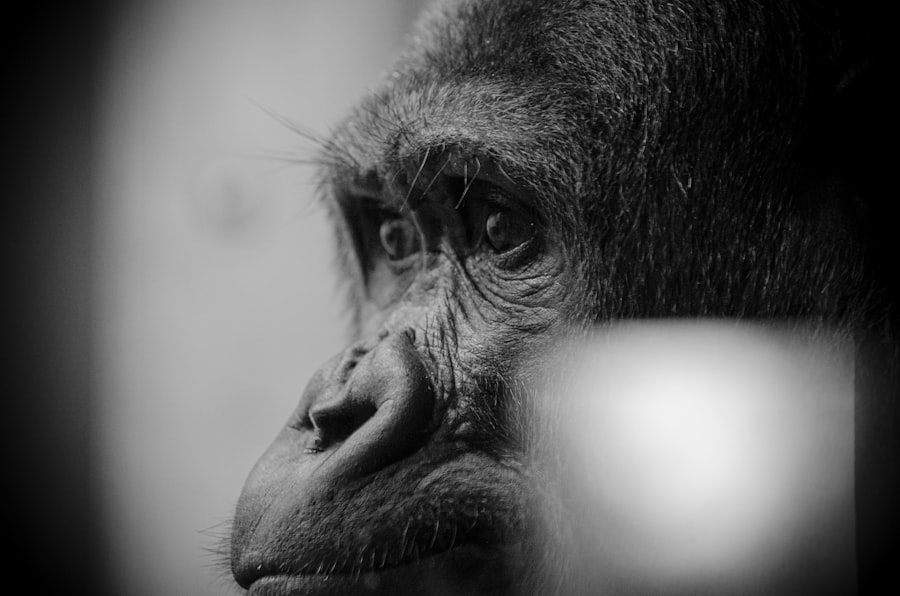As you delve into the origins of shame, it becomes evident that this complex emotion has deep roots in our evolutionary history. Evolutionary psychology suggests that emotions like shame have developed as adaptive responses to social environments. In early human societies, where cooperation and social bonds were essential for survival, shame likely emerged as a mechanism to enforce social norms and promote group cohesion.
When individuals acted in ways that threatened the integrity of the group, feelings of shame would serve as a powerful deterrent against such behaviors. This emotional response not only helped maintain social order but also encouraged individuals to align their actions with the expectations of their peers. Moreover, the evolutionary perspective posits that shame is intricately linked to our need for acceptance and belonging.
In a world where being ostracized could mean death, the fear of shame would have been a strong motivator for individuals to conform to group standards.
Understanding the origins of shame in this context allows you to appreciate its role as a fundamental aspect of human interaction, shaping not only individual behavior but also the dynamics of entire communities.
Key Takeaways
- Shame has evolutionary origins and may have served as a mechanism for social regulation and cooperation in early human societies.
- Shame may have played an adaptive function in human evolution by promoting social cohesion and cooperation within groups.
- Shame is closely related to self-preservation, as it can motivate individuals to avoid behaviors that may lead to social exclusion or rejection.
- Shame can serve as a mechanism for moral development, as it may lead individuals to internalize societal norms and values.
- Shame can be influenced by social hierarchies and may be used as a tool for social control within groups.
The Role of Shame in Social Regulation and Cooperation
Shame plays a crucial role in regulating behavior within social groups, acting as a social glue that binds individuals together. When you experience shame, it often serves as a signal that your actions have violated a social norm or expectation. This emotional response can prompt you to reflect on your behavior and make amends, fostering a sense of accountability.
In this way, shame acts as a regulatory mechanism that encourages individuals to adhere to the values and standards of their community, ultimately promoting cooperation and harmony. In addition to its regulatory function, shame can also enhance social cohesion by reinforcing shared values. When you witness someone else experiencing shame for their actions, it can evoke a sense of empathy and solidarity within the group.
This shared experience can strengthen social bonds, as members rally around the individual to offer support or guidance. By fostering an environment where individuals are held accountable for their actions, shame contributes to a culture of cooperation, where everyone is motivated to act in ways that benefit the collective.
The Adaptive Function of Shame in Human Evolution

The adaptive function of shame is evident when you consider its impact on human evolution. As social creatures, humans have always relied on cooperation for survival. Shame serves as an emotional tool that encourages individuals to prioritize group welfare over personal desires.
When you feel shame for acting selfishly or harming another member of your community, it prompts you to reconsider your actions and strive for better alignment with group values. This adaptive function has likely contributed to the survival of our species, as those who were able to navigate social dynamics effectively were more likely to thrive. Furthermore, the ability to experience shame has implications for moral development.
As you grow and learn about societal norms, your capacity for shame helps shape your understanding of right and wrong. This emotional response encourages you to internalize moral values and develop a conscience, guiding your behavior in ways that promote social harmony. In this sense, shame is not merely a negative emotion; it is an essential component of moral reasoning that has evolved to support the complexities of human relationships.
The Relationship Between Shame and Self-Preservation
| Shame and Self-Preservation | Metrics |
|---|---|
| Shame | Feelings of inadequacy, unworthiness, and self-blame |
| Self-Preservation | Protecting oneself from harm or danger |
| Relationship | Shame can lead to self-preservation behaviors such as avoidance, withdrawal, or self-sabotage |
Shame is intricately linked to self-preservation, both on an individual and societal level. When you experience shame, it often stems from a perceived threat to your self-image or social standing. This emotional response can trigger a fight-or-flight reaction, compelling you to either defend your reputation or withdraw from the situation altogether.
In this way, shame acts as a protective mechanism that helps you navigate social landscapes and avoid behaviors that could jeopardize your standing within a group. On a broader scale, the relationship between shame and self-preservation can be seen in how societies respond to transgressions. Communities often impose consequences for behaviors deemed shameful, reinforcing the idea that deviating from social norms can lead to ostracism or punishment.
This societal pressure serves as a deterrent against actions that could threaten group cohesion, ultimately promoting self-preservation at both individual and collective levels. By understanding this relationship, you can gain insight into how shame functions not only as an emotional response but also as a vital component of social survival.
Shame as a Mechanism for Moral Development
Shame plays a pivotal role in moral development, guiding you toward ethical behavior and decision-making. As you navigate various social contexts, your experiences with shame can shape your understanding of right and wrong. When you feel ashamed for acting in ways that conflict with your moral beliefs or societal expectations, it prompts introspection and encourages you to align your actions with your values.
This process fosters personal growth and ethical awareness, allowing you to develop a more nuanced understanding of morality. Moreover, the experience of shame can serve as a catalyst for empathy and compassion. When you recognize the impact of your actions on others and feel ashamed for causing harm or distress, it can motivate you to make amends and seek forgiveness.
This emotional response not only strengthens your moral compass but also enhances your ability to connect with others on a deeper level. By acknowledging the role of shame in moral development, you can cultivate greater self-awareness and empathy, ultimately contributing to a more compassionate society.
The Interplay Between Shame and Social Hierarchies

The interplay between shame and social hierarchies is a complex dynamic that influences how individuals navigate their relationships within various contexts. In many societies, status and power are closely tied to perceptions of honor and shame. When you occupy a lower position within a hierarchy, you may be more susceptible to feelings of shame when faced with criticism or disapproval from those in higher positions.
This dynamic can create a cycle where individuals strive for validation and acceptance from those above them while simultaneously grappling with their own feelings of inadequacy. Conversely, those in positions of power may wield shame as a tool for control and manipulation.
This interplay can perpetuate cycles of oppression and inequality, as individuals internalize feelings of shame that stem from societal expectations and power dynamics. Recognizing this relationship allows you to critically examine how shame operates within social structures and consider ways to challenge harmful hierarchies.
The Cross-Cultural Universality of Shame
Shame is often regarded as a universal emotion experienced across cultures, though its expression and significance may vary widely. As you explore different cultural contexts, you’ll find that while the feeling of shame is common, the triggers and responses associated with it can differ significantly. In some cultures, collectivist values may place greater emphasis on communal harmony, leading individuals to experience shame more acutely when they disrupt group cohesion.
In contrast, individualistic cultures may focus on personal achievement and autonomy, resulting in different manifestations of shame related to personal failure. This cross-cultural universality highlights the importance of understanding how cultural norms shape emotional experiences. As you engage with diverse perspectives on shame, you’ll gain insight into how societal values influence not only individual behavior but also collective responses to transgressions.
By appreciating these cultural nuances, you can foster greater empathy and understanding in your interactions with others, recognizing that while the experience of shame may be universal, its expression is deeply rooted in cultural context.
Shame and its Impact on Mental Health
The impact of shame on mental health is profound and multifaceted. When you experience chronic feelings of shame, it can lead to various psychological issues such as anxiety, depression, and low self-esteem. The internalization of shame often results in negative self-perception and self-criticism, creating a cycle that can be difficult to break.
As you grapple with these feelings, it’s essential to recognize how they can affect your overall well-being and interpersonal relationships. Moreover, the stigma surrounding mental health issues can exacerbate feelings of shame, leading individuals to suffer in silence rather than seek help. When societal norms dictate that vulnerability is a weakness, it becomes increasingly challenging for you to express your struggles openly.
This silence can perpetuate feelings of isolation and despair, further impacting your mental health. By acknowledging the relationship between shame and mental health, you can take proactive steps toward healing—whether through therapy, support groups, or self-compassion practices—that allow you to confront these feelings head-on.
Gender Differences in the Experience and Expression of Shame
Gender differences play a significant role in how individuals experience and express shame. Research indicates that women are often socialized to be more attuned to relational dynamics and communal expectations, which can lead them to experience shame more intensely in situations involving interpersonal conflict or perceived failure in nurturing roles. As you navigate these dynamics, you may find that societal pressures shape your understanding of success and failure differently based on gender norms.
Conversely, men may be socialized to suppress emotions like shame in favor of stoicism or aggression. This cultural conditioning can lead men to express their feelings through anger or withdrawal rather than openly confronting their experiences with shame. Understanding these gender differences allows you to appreciate how societal expectations influence emotional responses and interpersonal relationships.
By fostering open dialogue about these experiences across genders, you can contribute to creating an environment where individuals feel safe expressing vulnerability without fear of judgment.
Shame in the Context of Modern Society and Technology
In today’s digital age, the experience of shame has taken on new dimensions due to the pervasive influence of technology and social media. As you engage with online platforms, the potential for public scrutiny increases exponentially; moments of perceived failure or embarrassment can be amplified through viral sharing or online shaming campaigns. This phenomenon can lead to heightened feelings of shame among individuals who find themselves at the center of public criticism or ridicule.
Moreover, the curated nature of social media often exacerbates feelings of inadequacy by presenting idealized versions of life that are unattainable for most people. As you scroll through feeds filled with seemingly perfect images and accomplishments, it’s easy to fall into the trap of comparison—leading to feelings of shame when your reality doesn’t measure up. Recognizing this dynamic is crucial for navigating modern society; by cultivating awareness around these influences, you can develop healthier relationships with technology while fostering resilience against external pressures.
Strategies for Coping with and Overcoming Shame
Coping with and overcoming feelings of shame requires intentional effort and self-compassion. One effective strategy is practicing mindfulness—taking time to observe your thoughts without judgment allows you to create distance from feelings of shame rather than becoming consumed by them. By acknowledging these emotions without labeling them as inherently negative or defining aspects of yourself, you can begin to dismantle their power over your life.
Additionally, seeking support from trusted friends or mental health professionals can provide valuable perspectives on your experiences with shame. Sharing your feelings openly fosters connection and understanding while reminding you that you’re not alone in facing these challenges. Engaging in self-compassion practices—such as positive affirmations or journaling—can also help reframe negative self-talk associated with shame into more constructive narratives about growth and resilience.
By employing these strategies, you empower yourself to confront feelings of shame head-on while fostering personal growth and emotional well-being. Embracing vulnerability as part of the human experience allows you not only to heal but also to cultivate deeper connections with others who share similar struggles along their journeys toward self-acceptance.
In the realm of evolutionary psychology, the emotion of shame is often explored as a complex social mechanism that has evolved to maintain social cohesion and cooperation within groups. An intriguing article that delves into this topic can be found on Freaky Science, where the intricate dynamics of shame and its evolutionary roots are examined in detail. For those interested in understanding how shame functions as a regulatory emotion that influences social behavior and group dynamics, you can read more about it in this related article. This piece provides valuable insights into how shame has developed as a crucial component of human psychology, shaping interactions and societal norms throughout history.
WATCH THIS! The Default Mode Network: Why You Can’t Stop Thinking About That Cringe Moment
FAQs
What is evolutionary psychology?
Evolutionary psychology is a scientific discipline that examines how human psychological traits and behaviors have evolved over time to enhance survival and reproduction.
What is shame in the context of evolutionary psychology?
Shame is a universal emotion that serves as a social regulator, helping individuals navigate social interactions and maintain group cohesion. In the context of evolutionary psychology, shame is believed to have evolved as a mechanism to deter individuals from engaging in behaviors that could lead to social exclusion or loss of status within a group.
How does evolutionary psychology explain the function of shame?
Evolutionary psychologists propose that shame serves as a signal to others that an individual has violated social norms or expectations, and it can elicit reparative behaviors such as apology, restitution, or changes in behavior. This helps to maintain social harmony and cooperation within a group.
What are some adaptive functions of shame according to evolutionary psychology?
Evolutionary psychologists suggest that shame may have several adaptive functions, including deterring individuals from engaging in behaviors that could harm their social reputation, motivating individuals to adhere to social norms, and signaling to others that an individual is willing to make amends for their transgressions.
How does shame manifest in different cultures and societies?
While the basic function of shame may be universal, its expression and the specific triggers for shame can vary across different cultures and societies. Cultural norms, values, and social expectations can influence how shame is experienced and expressed by individuals.
